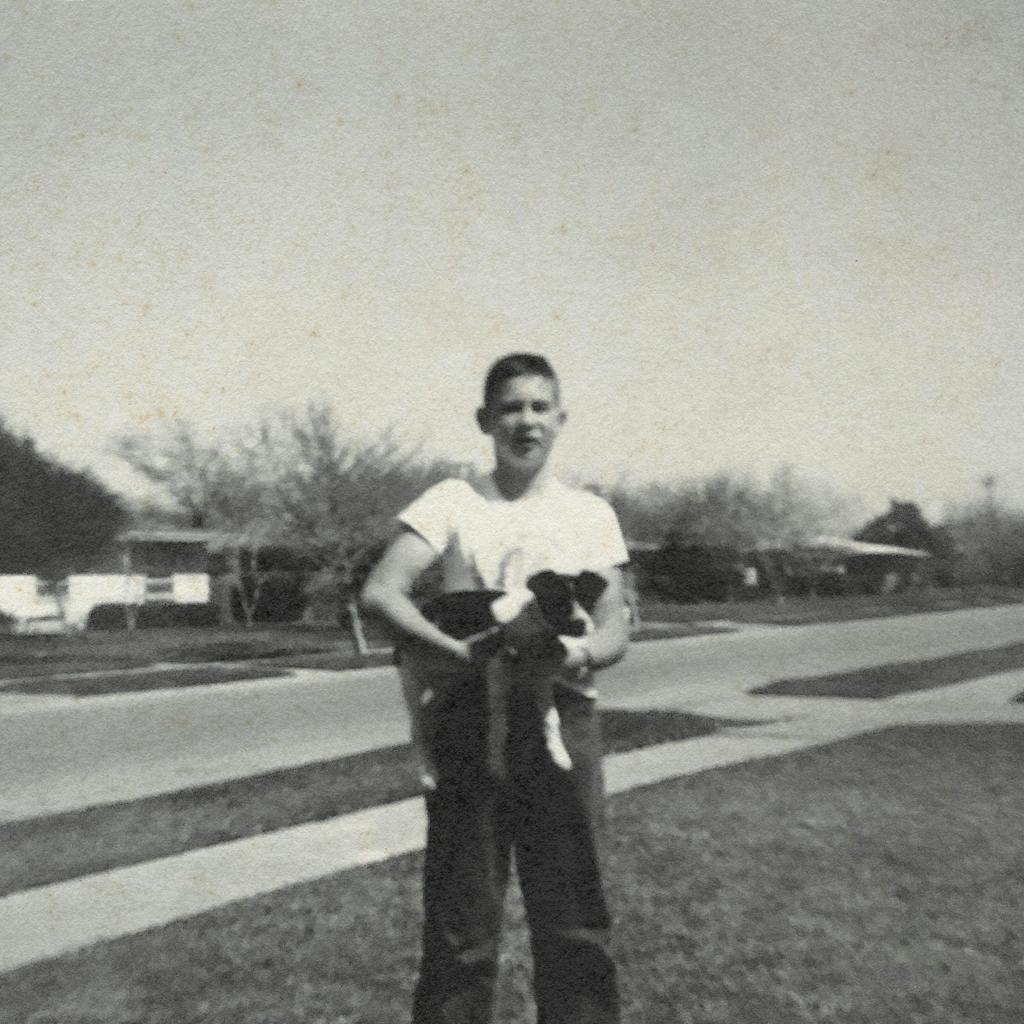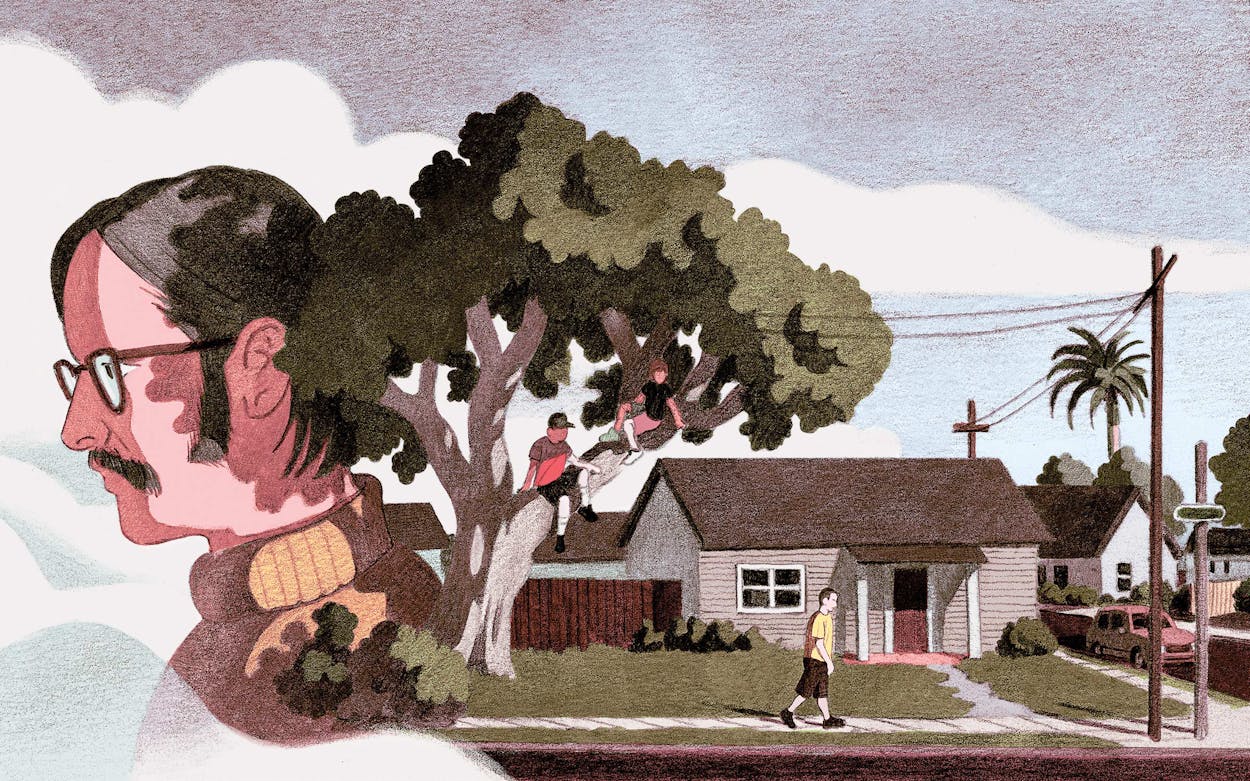“Do you know that guy?”
The question came from above and behind me, as I walked down Center Drive in Corpus Christi on my way to the Lamar Park Pharmacy. I was an eleven-year-old boy in the middle of an idle summer in 1960, bored, hot, heading for the drugstore’s air-conditioning and its revolving paperback rack.
I heard the question from a kid sitting high up in the gnarly branches of a live oak tree, but if his friend replied, I was already too far down the street to make out what he said. And I was too nervous to look back to see who was talking about me. The voice in the tree was unfamiliar, and his face probably would have been as well. But the fact that he had asked the question must have meant he had seen me before or knew of me somehow or wondered enough about the boy passing beneath him to ask who I was.
I had been noticed. I had some kind of reputation or had at least evoked some kind of curiosity. I wasn’t sure whether the sensation was empowering or threatening, but it felt new—unexpected evidence that beyond the closed circle of my self-awareness there existed something like another me.
Children begin developing a suspicion that they are individual beings, separate from the world around them, when they are still very young, fifteen to eighteen months of age. But recognizing myself in a mirror was an event lost to the mists of infancy, whereas hearing myself referred to as “that guy” was a landmark discovery I’m still processing.
I remember consciously squaring my shoulders as I walked, trying to make myself a little taller and straighter. I wanted to give an impression of someone who wasn’t concerned with what other people thought of him, who lived securely within his authentic self.
For most of us, though, authenticity is a product of fakery. As we get older, we get better at dialing ourselves in, smoothing the static between what we broadcast to the world and what we feel inside. But if you’re like me, you can never quite leave your impostor self behind, never quite get over the sense that you’re merely playing the role of someone who is self-reliant, self-possessed, and unworried about the overheard commentary of strangers.

Seven years after my childhood epiphany on Center Drive, I was back in Corpus after my first year of college, working as a lifeguard at the Knights of Columbus pool. I was marooned. All my friends had managed to stay in Austin, the buzzy center of the Texas proto-counterculture. It was 1967, the Summer of Love. From the lifeguard stand I listened to the taunting songs that poured out of the radio, advertising that I was not in the right place. “There’s something happening here,” declared Buffalo Springfield. Wrong. Nothing was happening in Corpus Christi, Texas, in 1967.
Worse was that summer’s big hit by Scott McKenzie. It’s embarrassing now to think about the shattering FOMO conjured up by its lyrics—“If you’re going to San Francisco / Be sure to wear some flowers in your hair”—but it was legitimate torture at the time. I was pretty sure I wasn’t cut out to be a flower child, but the cultural earthquake promised by the song—“All across the nation / Such a strange vibration”—was definitely not showing up on my Richter scale. Sitting in my lifeguard stand, yelling at kids all day not to run on the pool’s slippery concrete edging, I felt that I was living outside of my own times and outside of my ideal self.
The one time I pulled a potential drowning victim out of the water only confirmed the distance between who I wanted to be and who I really was. I saw a little girl struggling in the deep end, her chin just above the surface, a look of panicky confusion on her face. I jumped into the water, grabbed her by the arm, and swam her to the edge of the pool, where her mother distractedly thanked me and took over. I wanted to feel like a hero, but all I felt was embarrassment. It turned out I was not the coolheaded, all-in-a-day’s-work rescuer I had been mentally rehearsing to be. I was seized by an unseemly case of after-action nerves. My hands were shaking so badly from the unwarranted adrenaline flood of a simple assist that it took me a moment to calm down enough to climb back up to my lifeguard roost.
Meanwhile Scott Mackenzie kept singing about San Francisco. “Summertime will be a love-in there,” he declared. As it turned out, there was a love-in, or a be-in, or a happening, or a something, planned for even Corpus Christi.
The event was to take place on my day off, at Brawner Parkway, a boulevard with a wide, grassy ditch that meandered through the east side of town and sometimes functioned as an unofficial gathering place. Since my friends were out of town, I worked up the courage to go alone. I gave some thought to what I should wear. From God knows where I had acquired a dusty old tweed driving cap that for some reason struck me as the perfect accoutrement for someone trying to fit in with the Summer of Love.
And since it felt like I should bring a contribution to whatever festivities were going on, I grabbed my melodica. Melodica? Not the most iconic musical instrument for this paradigm-shifting era, but it was the only one I had. I had gotten it for Christmas after seeing it for sale in the record store at Six Points where I had bought the soundtracks to Doctor Zhivago, El Cid, The Fall of the Roman Empire, and other albums that nourished my out-of-sync-with-the-times musical tastes. The melodica was made of plastic and looked like a big harmonica, except it had a keyboard and a mouthpiece you blew into.
One problem: I didn’t know how to play it. After trying and failing to master the simplest chords on the guitar, I had shifted to the melodica because it looked so easy. But it turned out you had to know about notes and octaves and stuff for it to produce anything that sounded like music.
Nevertheless, I carried it in its gray vinyl case to my rendezvous with flower-power destiny at Brawner Parkway. I was eighteen, old enough to know that if I were called upon to play the melodica I would be humiliated but still young and naive enough to believe that, if the ultimate test came, my fingers would somehow know where to place themselves on the keyboard.
It never came to that. I never even talked to anybody. I don’t remember anything happening at the happening except for a few dozen people my age doing their best to provide an impression of feckless, unstructured fun. This mostly involved them either standing around in scattered groups listening to someone strum a guitar or rolling down the shallow drainage slopes, pretending that they were experiencing a delirious free fall.
As I sat there by myself, watching the half-hearted wild abandon taking place around me, I had never felt more conspicuous or more out of place—or more aware of the gulf that existed between the persona I sought to project and the insecure self that had no business being at a be-in. Maybe some of the people there were feeling something similar. I could tell they were trying too hard to have fun, to fit in with a massive shift of consciousness that had not yet been defined and, from this ditch in Corpus Christi, could still barely be detected.
But at least they were there with friends, and at least some of them could play the guitar. Whereas I was a solitary drop-in. An off-duty lifeguard, an off-brand hippie with a stupid melodica that he both feared and irrationally wished somebody would ask him to play.
After about a half hour I slunk off, without, I hoped, anybody noticing. But if they did, the question they would have asked one another—“Do you know that guy?”—would have been the same question that kid had asked from the tree years before, and one I’ve been posing to myself in the decades since.
Cringey attempts to become someone we know in our hearts we’re not is probably a universal youthful experience, but for certain kinds of people—actors, politicians, writers—a lingering authenticity gap is an occupational hazard. “Are you that character in your book?” novelists get asked all the time. We usually answer no, of course not, but the truth is that it’s sometimes hard to know. We’ve spent so many months or years endowing that character with qualities we wish we had—or fear we might—that we’re a bit confused ourselves.
That’s not the only way the act of writing has been, for me, a breeding ground for identity confusion. When I first started publishing my work, not so long after I saw the wisdom of making my escape from that be-in, I signed it “Stephen Harrigan.” What was that all about? I had always been Steve. Nobody had ever called me Stephen, even though it was on my birth certificate. But I wanted to be taken seriously as a writer and assumed that a less casual, more chin-stroking version of my name would increase the odds of that happening.
I guess I’m glad I made that choice. I’m a bit ashamed of leaving my
average-Joe name in the dust for the sake of a gravitas boost, but it has helped to separate me from the Fox News reporter Steve Harrigan. Although not always. Once, my sort-of doppelgänger found himself ensnared in a foreign correspondents’ controversy when CNN’s Nic Robertson more or less accused him of dereliction of duty for staying behind in his hotel room at one point during the 2011 Libyan civil war. I might be misremembering that the lead story on the Hollywood Reporter website featured the words “Steve Harrigan” and “Cowardice” in its headline, but that was certainly my queasy takeaway. And my memory is sparklingly clear that beneath the headline there was a huge photo, not of the other guy but of me.
I was irritated, then weirdly outraged, as if there had not just been a mistaken photo swap but that my character had been assaulted by this Nic Robertson guy. How dare anyone accuse me of cowardice! After a few calming breaths, though, I came to my senses and realized that at some level the charge was perfectly accurate. At least the other Steve Harrigan—
who denied Robertson’s allegations—was in Libya covering a war, whereas I was safely at home in the USA popping a bag of Orville Redenbacher’s in the microwave.
The irony was that a part of me wanted to be that other Steve Harrigan, just as I had wanted to be the unflappable lifeguard or the mysterious solo melodica artist of Brawner Parkway. It’s the same sort of identity divide I experience when I sit down to compose a piece like this, hoping the sentences themselves will project a confidence that the writer setting them down, deleting them, reformulating them, sweating every clause and word choice, will never feel.
“Do you know that guy?” I heard that unseen voice ask long ago.
Yes, I know him well. I’m just not sure he’s me.
This article originally appeared in the March 2024 issue of Texas Monthly with the headline “The Voice in the Live Oak.” Subscribe today.
- More About:
- Corpus Christi








